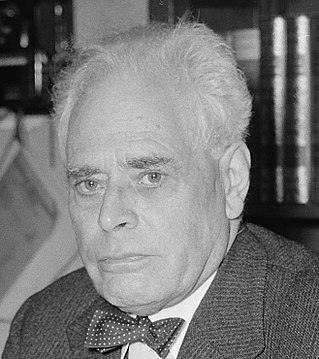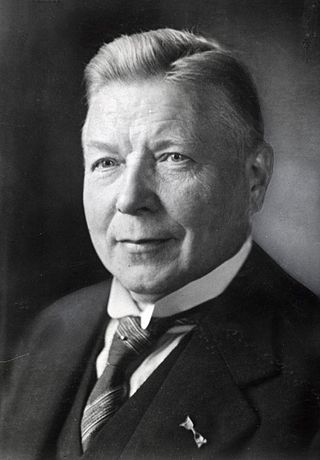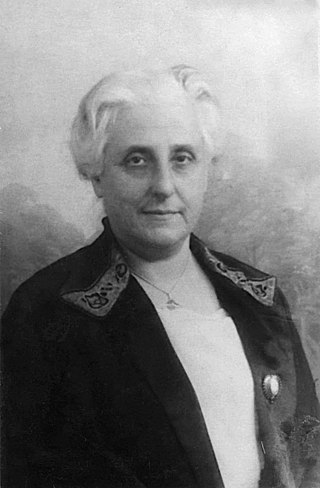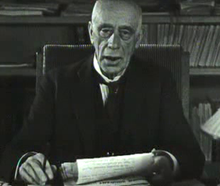
The Anti-Revolutionary Party was a Protestant conservative and Christian democratic political party in the Netherlands. The party was founded in 1879 by Abraham Kuyper,a neo-Calvinist theologian and minister. In 1980 the party merged with the Catholic People's Party (KVP) and the Christian Historical Union (CHU) to form the Christian Democratic Appeal (CDA).

JonkheerDirk Jan de Geer was a Dutch politician of the defunct Christian Historical Union (CHU) now merged into the Christian Democratic Appeal (CDA). He served as Prime Minister of the Netherlands from 8 March 1926 until 10 August 1929 and from 10 August 1939 until 3 September 1940.

General elections were held in the Netherlands on 17 and 25 June 1913. Despite receiving the fourth highest number of votes,the General League of Roman Catholic Caucuses emerged as the largest party,winning 25 of the 100 seats in the House of Representatives. After the election,the independent liberal Pieter Cort van der Linden became Prime Minister of the Netherlands,leading a cabinet of Liberals,Free-thinking Democrats,Christian Historicals and other independent liberals.

The Free-thinking Democratic League was a progressive liberal political party in the Netherlands. Established in 1901,it played a relatively large role in Dutch politics,supplying one Prime Minister,Wim Schermerhorn. The League is a predecessor of two of the major Dutch political parties,the conservative-liberal People's Party for Freedom and Democracy (VVD) and the social-democratic Labour Party (PvdA). The social-liberal Democrats 66 also claims that it and the VDB are ideologically connected.

Hendrikus "Hendrik" Colijn(22 June 1869 –18 September 1944) was a Dutch politician of the Anti-Revolutionary Party. He served as Prime Minister of the Netherlands from 4 August 1925 until 8 March 1926,and from 26 May 1933 until 10 August 1939.
The Liberal State Party,"the Freedom League",was a conservative liberal political party in the Netherlands from 1921 to 1948. It is historically linked to the People's Party for Freedom and Democracy (VVD),a major Dutch political party.

Pieter Jacobus Oud was a Dutch politician of the defunct Free-thinking Democratic League (VDB) party and later co-founder of the Labour Party (PvdA) and the People's Party for Freedom and Democracy (VVD) and historian. He was granted the honorary title of Minister of State on 9 November 1963.

This article gives an overview of Christian democracy in the Netherlands,which is also called confessionalism,including political Catholicism and Protestantism. It is limited to Christian democratic parties with substantial support,mainly proved by having had a representation in parliament. The sign ⇒means a reference to another party in that scheme.

Adolf Marcus "Dolf" Joekes was a Dutch politician and diplomat of the defunct Free-thinking Democratic League (VDB) and later co-founder of the Labour Party (PvdA) and businessman.

Jan Rudolph Slotemaker de Bruïne was a Dutch politician of the defunct Christian Historical Union (CHU) party now merged into the Christian Democratic Appeal (CDA) party and theologian.

Jacob Adriaan de Wilde was a Dutch politician of the defunct Anti-Revolutionary Party (ARP) now merged into the Christian Democratic Appeal (CDA) party and jurist.

The Second De Geer cabinet,also called the First London cabinet,was the cabinet of the Netherlands from 10 August 1939 until 3 September 1940. The cabinet was formed by the political parties Roman Catholic State Party (RKSP),Social Democratic Workers' Party (SDAP),Anti-Revolutionary Party (ARP),Christian Historical Union (CHU) and the Free-thinking Democratic League (VDB) following the dismissal of the Fifth Colijn cabinet by Queen Wilhelmina on 27 July 1939. The national unity government became a War cabinet on 14 May 1940 following the German invasion and fled to London. The government-in-exile was dismissed by Queen Wilhelmina on 26 August 1940.

The Third Colijn cabinet was the cabinet of the Netherlands from 31 July 1935 until 24 June 1937. The cabinet was formed by the political parties Roman Catholic State Party (RKSP),Anti-Revolutionary Party (ARP),Christian Historical Union (CHU),Liberal State Party (LSP) and the Free-thinking Democratic League (VDB) after the resignation of the Second Colijn cabinet on 23 July 1935. The centre-right cabinet was a majority government in the House of Representatives and was a continuation of the previous Cabinet Colijn II. It was the third of five cabinets of Hendrikus Colijn,the Leader of the Anti-Revolutionary Party as Prime Minister.

The Second Colijn cabinet was the cabinet of the Netherlands from 26 May 1933 until 31 July 1935. The cabinet was formed by the political parties Roman Catholic State Party (RKSP),Anti-Revolutionary Party (ARP),Christian Historical Union (CHU),Liberal State Party (LSP) and the Free-thinking Democratic League (VDB) after the election of 1933. The centre-right cabinet was a majority government in the House of Representatives. It was the second of five cabinets of Hendrikus Colijn,the Leader of the Anti-Revolutionary Party as Prime Minister.

The First De Geer cabinet was the cabinet of the Netherlands from 8 March 1926 until 10 August 1929. The cabinet was formed by the political parties Roman Catholic State Party (RKSP),Anti-Revolutionary Party (ARP) and the Christian Historical Union (CHU) following the fall of the First Colijn cabinet on 11 November 1925.

Arie Adriaan "Aat" van Rhijn was a Dutch politician of the defunct Christian Historical Union (CHU) party and later of the Labour Party (PvdA) and jurist.

Bertha "Betsy" Bakker-Nort was a Dutch lawyer and politician who served as a member of the House of Representatives for the Free-thinking Democratic League (VDB) from 1922 to 1942.

Hendrika Wilhelmina Bernardina "Mien" van Itallie-van Embden was a Dutch lawyer and politician who served as a member of the House of Representatives from 1928 until 1933 for the Free-thinking Democratic League (VDB).

The Democratic Party was a left liberal political party in the Netherlands. It was founded in 1921 by Jan Ernst Heeres when the Liberal Union,of which he was president,failed to merge with the Free-thinking Democratic League (VDB),and instead merged with the more conservative League of Free Liberals and Economic League.


















